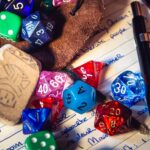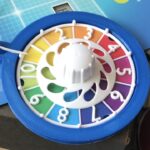As I hit my two-year mark as a Dungeon Master, I’ve been reflecting on what has made the biggest difference in how I run games. Out of all of the media and advice I consumed, it was playing non-5e TTRPGs that made me grow the most. Trying new systems pushed me out of my comfort zone and gave me tools and ideas not offered in a normal 5e experience. If you’ve only ever played D&D, do yourself a favor and branch out—you’ll come back to your table better. Here are three RPGs that changed the way I DM.
Scum & Villainy
Scum & Villainy is the Sci-Fi version of Blades in the Dark. Your players play either space pirates or rebels who are against an intergalactic hegemony with only a scrappy ship and maybe some psychic powers on their side.
The first genius thing that these “Forged in the Dark” systems all have are clocks. These are essentially countdown timers that fill up a certain amount based on how much the PCs fail or succeed. These showed that PCs failing a roll does not need to immediately trigger a failure state, but rather can be a step towards it. An example being a PC failing a stealth roll filling out 3/6ths of the clock “Guards find you” and slightly getting the guards attention rather than just immediately alerting them to the PCs presence.
The game also has a strong reliance on factions and the PCs relationship to the factions around the settings. It is built into the system that the missions PCs choose have a direct affect on their relationship with the factions and naturally as they screw over more and more of them, one will naturally rise as their main rival. This gives the PCs a real sense of agency in the game and this style of play is something I directly use in my 5e and PF2e games.
Stars Without Number
Stars Without Number is a Sci-Fi OSR style game that focuses on sandbox play. Kevin Crawford is one of the greatest TTRPG creators we currently have and all of his “Without Number” books are phenomenal.
The main thing that this book taught me is that worldbuilding can be easy. The tables provided in the “Without Number” books are the best I have found in the hobby, maybe tying with the “Dread Thingonomicon.” They focus on all different aspects of the setting your PCs are exploring with ideas, missions, rewards, and anything you would need to run your game.
I think the primary thing I noticed when reading them is that most of the tables focus on things that the PCs will directly interact with, rather than useless bits of information that will not improve the game. A large trap for new DMs can be worldbuilding, so a system that gives it bounds can be crazy helpful. I also like that the tables provide a base of information that the DM can build off of rather than being overly detailed.
Lancer
If you have not picked up by now, I did have a bit of a Sci-fi phase in my DMing career. Lancer is a sci-fi mech TTRPG with a heavy focus on crunchy mech combat and more rules-lite narrative sections. It is also my favorite TTRPG at the moment.
Lancer has a NPC system for enemy combatants that is incredibly fun. Enemy mechs have a base type and can be upgraded and modified to give them variety and to create bosses. Types include Ronins who get up close to players with swords, Operators who hack enemy mechs, or barricades who block the battlefield with shield and cover.
These types rewired how I looked at monsters in D&D and other TTRPGs. A lot of monsters in 5e can fall into categories of ranged, melee, protectors etc. but it was never something I thought about before or that the game made explicit. After I begun applying more strategic roles to D&D monsters my players talked about how much combat had improved and how they loved the new challenge. These ideas are also explored in “Flee Mortals” and “Forge of Foes” which implement them incredibly in 5e, but came out after I had already played Lancer.
If you find yourself in need of a DM shakeup or want to really improve your skills pick up a new RPG and run it!








